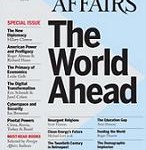A major strategic challenge for the United States in the coming decades will be integrating emerging powers into international institutions. The dramatic growth of Brazil, China, and India — and the emergence of middle-tier economies such as Indonesia and Turkey — is transforming the geopolitical landscape and testing the institutional foundations of the post-World War II liberal order. The Obama administration promotes developing cooperative relations with emerging powers, believing that countries with a stake in world affairs will become responsible global actors. But the United States should be under no illusions about the ease of socializing rising nations. Emerging powers may be clamoring for greater global influence, but they often oppose the political and economic ground rules of the inherited Western liberal order, seek to transform existing multilateral arrangements, and shy away from assuming significant global responsibilities.
Over the next ten years and beyond, the United States will have to accommodate new powers in reformed structures of global governance while safeguarding the Western liberal order it helped create and defend. The world is entering a chaotic era. Global visions will compete, norms will shift, and yesterday’s rule takers will become tomorrow’s rule makers. The United States will have to make both practical and psychological adjustments. U.S. officials need to recalibrate their aspirations for multilateral cooperation and reexamine long-standing assumptions about the United States’ role in the world.
This article was originally published by Foreign Affairs. You can read the rest of the article here.
You can read exclusive content from Gateway House: Indian Council on Global Relations, here.
Copyright © 2010 by the Council on Foreign Relations, Inc.


